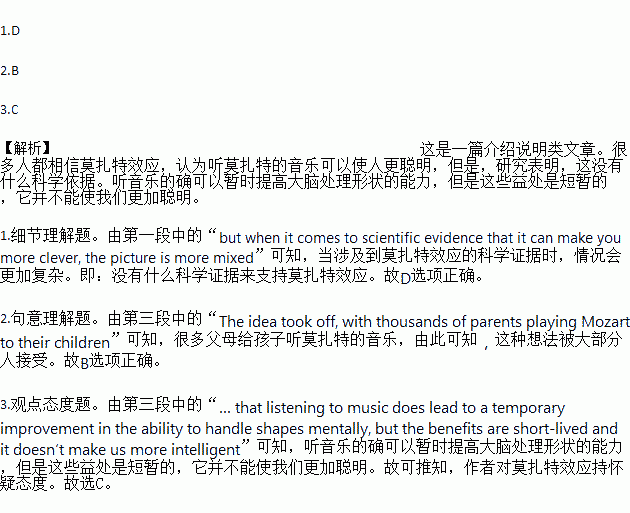题目内容
You have probably heard of the Mozart effect. It’s the idea that if children or even babies listen to music composed by Mozart, they will become more intelligent. A quick Internet search reveals plenty of products to assist you in the task. Whatever your age there are CDs and books to help you taste the power of Mozart’s music, but when it comes to scientific evidence that it can make you more clever, the picture is more mixed.
The phrase “the Mozart effect” was made up in 1991, but it was a study described two years later in the journal Nature that sparked(激发) real media and public interest about the idea that listening to classical music somehow improves the brain. It is one of those ideas that sound reasonable. Mozart was undoubtedly a genius himself; his music is complex and there is a hope that if we listen to enough of it, we’ll become more intelligent.
The idea took off, with thousands of parents playing Mozart to their children, and in 1998 Zell Miller, the Governor of the state of Georgia in the US, even asked for money to be set aside in the state budget so that every newborn baby could be sent a CD of classical music. It was not just babies and children who were exposed to Mozart’s music on purpose, even an Italian farmer proudly explained that the cows were played Mozart three times a day to help them to produce better milk.
I’ll leave the debate on the impact on milk yield to farmers, but what about the evidence that listening to Mozart makes people more intelligent? More research was carried out but an analysis of sixteen different studies confirmed that listening to music does lead to a temporary improvement in the ability to handle shapes mentally, but the benefits are short-lived and it doesn’t make us more intelligent.
1.What can we learn from paragraph 1?
A. Mozart composed many musical pieces for children.
B. Children listening to Mozart will be more intelligent.
C. There are few products on the Internet about Mozart’s music.
D. There is little scientific evidence to support Mozart effect.
2.The underlined sentence in paragraph 3 suggests that ________.
A. people were strongly against the idea
B. the idea was accepted by many people
C. Mozart played an important part in people’s life
D. the US government helped promote the idea
3.What is the author’s attitude towards the Mozart effect?
A. Favorable. B. Objective. C. Doubtful. D. Positive.
 天天向上一本好卷系列答案
天天向上一本好卷系列答案 小学生10分钟应用题系列答案
小学生10分钟应用题系列答案随着网络的日益发展,网店成为一种新时尚,并且越来越多的学生开始创办网店。假定你是李华,是校报记者,请以“学生是否可以开办网店”为主题给校报撰稿。
支持 | 反对 | 你的观点 |
早一步接触社会 得到实践的机会 | 分心,影响学业; 社会经验少,容易被骗 | ... |
注意:
1.词数100左右;
2.可以适当增加细节,以使行文连贯;
3.标题和开头已经写好,不计入总词数。
Should Students Open Online Stores?
With the Internet developing rapidly, creating an online store becomes trendy. ___________________________________
_________________________________________________________________________________________________________________________________________________________________________________________________________________________________________________________________________________________________________________________________


 g you find interesting or unusual. For example,you could make a mental note:“Vicki Cheng -- tall, black hair.” To reinforce your associations, write them on a small card as soon as possible.
g you find interesting or unusual. For example,you could make a mental note:“Vicki Cheng -- tall, black hair.” To reinforce your associations, write them on a small card as soon as possible.